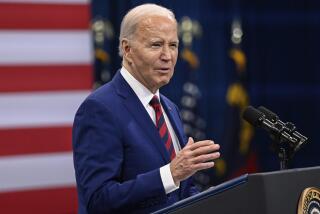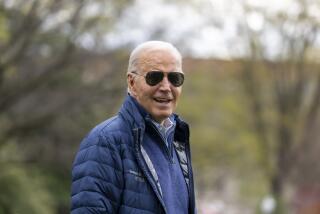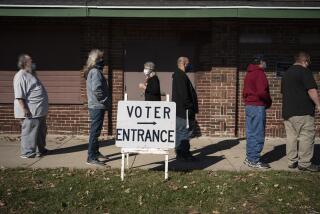Democrats vow to skip defiant states
The muddled 2008 presidential nomination calendar gained some clarity Saturday -- at least on the Democratic side -- as the party’s major candidates agreed not to campaign in any state that defies party rules by voting earlier than allowed.
Their collective action was a blow to Florida and Michigan, two states likely to be important in the general election, which sought to enhance their clout in the nominating process as well.
Front-runner Sen. Hillary Rodham Clinton of New York followed Sen. Barack Obama of Illinois and former Sen. John Edwards of North Carolina in pledging to abide by the calendar set by the Democratic National Committee last summer. The rules allow four states -- Iowa, Nevada, New Hampshire and South Carolina -- to vote in January.
The four “need to be first because in these states ideas count, not just money,” Edwards said in a written statement. “This tried-and-true nominating system is the only way for voters to judge the field based on the quality of the candidate, not the depth of their war chest.”
Hours later, after Obama took the pledge, Clinton’s campaign chief issued a statement citing the four states’ “unique and special role in the nominating process” and said that the New York senator, too, would “adhere to the DNC-approved calendar.”
Three candidates running farther back in the pack -- New Mexico Gov. Bill Richardson and Sens. Christopher J. Dodd of Connecticut and Joseph R. Biden Jr. of Delaware -- said Friday they would honor the pledge, shortly after the challenge was issued in a letter co-signed by Democratic leaders in the four early states.
To campaign or not to campaign has been a vexing question facing presidential hopefuls from both major parties, who have watched the election landscape shift with every change in the political calendar.
Trying to bring order to chaos, the national Democratic and Republican parties are undertaking efforts to strip delegates from Florida, Michigan and any other state that votes outside a prescribed window. That would greatly diminish those states’ clout because the nominating fight is all about winning delegates to the parties’ national conventions. Take away the delegates and there’s less incentive for candidates to invest time and resources.
The political calculations are different for Republicans and Democrats, given each party’s rules.
The Republicans set their nominating guidelines at their 2004 national convention. The GOP gave states a window between Feb. 5 and July 28, 2008, to hold their primaries and caucuses. Any state in violation -- and already several are at risk, including Florida, New Hampshire and South Carolina -- could lose half or more of their delegates to the convention a year from now in Minneapolis.
States have until Tuesday to submit their schedules to the Republican National Committee, which will review the calendar and issue any sanctions by year’s end. Iowa and Nevada are exempt because they are holding nonbinding caucuses -- not primaries -- in January.
For GOP candidates, there is good reason to campaign in the early states, even if they are sanctioned. “There are still delegates that are in play, and there’s momentum and electability, which are invaluable,” said Carl Forti, political director for former Massachusetts Gov. Mitt Romney, a leading GOP contender. “We’ll play the calendar start to finish.”
The situation is more complicated for Democrats.
Florida, the state that proved pivotal in the 2000 presidential election, is again a source of much upheaval. Ignoring the rule that put January off-limits, legislators moved the state’s primary up to Jan. 29, pushing Florida past California and other big states voting Feb. 5.
Leaders of the national party responded last month by giving Florida 30 days to reconsider, or have its delegates barred from the August convention in Denver.
“The party had to send a strong message to Florida and the other states,” said Donna Brazile, a veteran campaign strategist and member of the Democratic National Committee, the party’s governing body. “We have a system that is totally out of control.”
Despite that warning, Michigan lawmakers moved last week to jump the queue, voting to advance the state’s primary to Jan. 15.
Democratic Gov. Jennifer M. Granholm, who has been prepared to sign the legislation, did not back down Saturday. “We expect that all of the Democratic candidates for president will be on the ballot in Michigan on Jan. 15,” she told the Associated Press. “We hope that every candidate will campaign here.”
Karen Thurman, chairwoman of the Florida Democratic Party, took a less diplomatic tack. She criticized the candidates’ pledge, calling it “a pact to ignore tens of millions of diverse Americans by a selfish, four-state alliance of party insiders.”
Some Democrats believe a compromise may be reached in which Florida and Michigan vote early but apportion their delegates later in a separate step, which would give them a higher profile without breaking party rules and risking banishment from the national convention. But that would give the White House candidates little reason to show up.
“A lot of the focus has been on seats at the Pepsi Center,” said a strategist for one of the top Democratic contenders, referring to the convention site. He spoke anonymously, to avoid creating ill will among state party leaders. “But for the presidential campaigns, it’s the front end that matters. If you’re trying to get delegates, and Florida and Michigan don’t contribute anything, you really have to weigh carefully whether to spend resources in a state like that.”
The decision was easier for some candidates: Edwards seemed to be banking on an Iowa-or-bust strategy; others lack the money to compete heavily beyond the early states.
But pledge or no, the Democratic candidates won’t completely ignore states facing sanction. Eight of them are expected to show up next Sunday at the University of Miami for the campaign’s first Spanish-language debate. They may very well be asked when -- and whether -- they plan to come again.
mark.barabak@latimes.com
More to Read
Start your day right
Sign up for Essential California for news, features and recommendations from the L.A. Times and beyond in your inbox six days a week.
You may occasionally receive promotional content from the Los Angeles Times.







